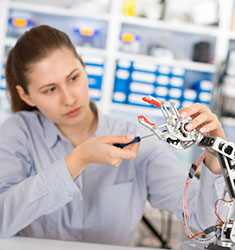Program DescriptionBiomedical engineers combine engineering principles with medical and biological sciences, with the goal of designing and creating equipment, devices, computer systems, and software to be used in healthcare. At the University of Utah, the Department of Biomedical Engineering’s mission is to advance human understanding, health, and the quality of life through research and education in this field. The department is internationally recognized for its research, discovery, and invention in the area of biomedical engineering, with research strengths in biomaterials, biomedical devices, neural engineering, and cardiovascular engineering; the Biomedical Engineering program is additionally accredited by the Engineering Accreditation Commission of ABET. It prepares its graduates for success and leadership in industry, as well as future study in medicine, science, and engineering. In addition to education in biology concepts, biomedical engineering students will receive training through the John and Marcia Price College of Engineering to deliver biobased solutions to traditional engineering problems. Regardless of your specific interest area, biomedical engineering is an exciting field that will allow you to combine your passions for biology and engineering while helping to improve people’s lives. The Student ExperienceStudents can pursue original research projects through the Office of Undergraduate Research or further their interdisciplinary skills sets by completing the Biomedical Engineering Entrepreneurship or John and Marcia Price College of Engineering Entrepreneurship programs. The department also has wonderful opportunities for student involvement which include becoming a member of the Biomedical Engineering Society (BMES) and participating in the Society of Women Engineers. Career OpportunitiesBiomedical engineers can find work in a number of fields. Consider careers in bioinstrumentation (using electronics to develop medical devices), biomaterials (using materials to develop medical devices), biomechanics (using mechanics to solve medical problems), rehabilitation engineering (creating devices to assist with mental and physical rehabilitation), or systems physiology (how an organism’s internal systems function and respond to changes). Put your undergraduate research experience to work by joining a research facility or lab, or continue your education at the graduate level to become a professor, physician, or pharmacist. |
More Info
CatalogExploratory Classes
|

 Biomedical Engineering
Biomedical Engineering


